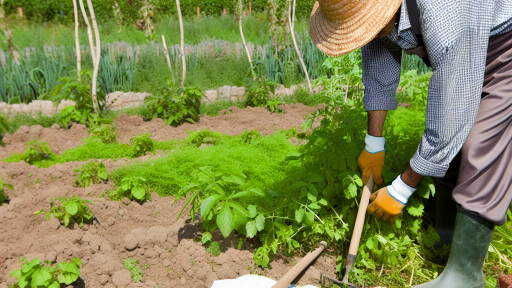Understanding the Organic Market
Trends in Organic Consumption
The organic market is rapidly expanding across the globe.
Consumers prioritize health and wellness in their purchasing decisions.
They are increasingly aware of the benefits of organic products.
This growing awareness directly influences purchasing behavior.
Moreover, young consumers drive much of this trend.
They value sustainability and environmental responsibility.
These trends create opportunities for organic producers.
Shifting Consumer Preferences
Many consumers now prefer foods with transparent sourcing.
They desire to understand where their food comes from.
Additionally, labels such as “non-GMO” significantly impact choices.
As a result, certification becomes crucial for organic producers.
Many consumers are willing to pay a premium for high-quality organic products.
Brand loyalty often develops from these consumer preferences.
Market Demographics
Different demographics show varying attitudes toward organic products.
Young professionals often exhibit a strong interest in organic options.
Transform Your Agribusiness
Unlock your farm's potential with expert advice tailored to your needs. Get actionable steps that drive real results.
Get StartedFamilies frequently seek organic foods for health benefits.
Additionally, older consumers may prioritize organic for taste and quality.
Understanding these demographics helps tailor marketing strategies.
Competitive Landscape
The organic food market features both large and small producers.
Competition is heating up as more brands enter the field.
Existing brands must innovate to retain market share.
Emphasizing unique selling propositions becomes essential.
Quality assurance and customer satisfaction should be top priorities.
Building a Brand Identity for Organic Produce
Defining Your Mission and Values
Your mission should reflect your commitment to organic practices.
Clearly outline the values that guide your brand.
This creates a strong foundation for customer trust.
Creating a Unique Visual Identity
A distinctive logo is essential for brand recognition.
Select colors and fonts that convey the essence of organic products.
Consistent visual branding supports better consumer recall.
Incorporating Storytelling
Share your journey from farm to market.
Use storytelling to connect emotionally with customers.
Highlight your farming practices and their benefits.
This fosters a deeper connection and loyalty among consumers.
Engaging with Your Community
Participate in local farmers’ markets and events.
Support community initiatives that align with your values.
Building local relationships enhances your brand’s credibility.
Utilizing Social Media Effectively
Create informative and engaging content on social platforms.
Use eye-catching images to showcase your produce.
Interact with customers to build a loyal online community.
Showcase Your Farming Business
Publish your professional farming services profile on our blog for a one-time fee of $200 and reach a dedicated audience of farmers and agribusiness owners.
Publish Your ProfileLeveraging Customer Feedback
Encourage customers to share their experiences.
Analyze feedback to improve your products and services.
Positive reviews can significantly enhance brand reputation.
Ensuring Transparency
Be open about your farming practices and sourcing.
Share certifications that prove your organic status.
This assures customers about the integrity of your products.
Digital Marketing Strategies: Leveraging Social Media for Organic Sales
Understanding Your Audience
Identifying your target audience is crucial.
Use demographic data to understand who buys organic produce.
Engage with your audience through surveys and polls.
Analyze their preferences and purchasing behavior.
This information helps create tailored marketing strategies.
Choosing the Right Platforms
Select social media platforms that align with your audience.
For instance, Instagram works well for visually appealing content.
Facebook is effective for community engagement and ads.
Twitter can be used for real-time updates and promotions.
Consider TikTok for creative and engaging short videos.
Creating Engaging Content
Your content must capture attention quickly.
Use vibrant images of your organic produce.
Share behind-the-scenes videos of your farming process.
Incorporate user-generated content to build community trust.
Blog posts about tips for healthy eating can also be effective.
Utilizing Influencer Marketing
Collaborate with influencers in the health and wellness niche.
Choose individuals whose values align with organic farming.
They can showcase your products to a broader audience.
This form of endorsement increases credibility and visibility.
Track the engagement and effectiveness of these partnerships.
Running Targeted Advertising Campaigns
Use paid advertising to reach your desired audience.
Set clear goals for each campaign you run.
Utilize retargeting ads to reach interested customers.
Monitor performance and adjust campaigns as needed.
Analyze which ads drive the most conversions to optimize spending.
Engaging with Your Community
Engage directly with your audience through comments and messages.
Respond promptly to inquiries to enhance customer service.
Host live Q&A sessions to share knowledge about organic produce.
Create online groups for discussions around healthy eating.
This fosters a sense of community around your brand.
Measuring Success
Regularly track your social media analytics for insights.
Measure engagement rates, click-through rates, and conversions.
Utilize tools to automate this process for efficiency.
Adjust strategies based on data to enhance effectiveness.
Showcase Your Farming Business
Publish your professional farming services profile on our blog for a one-time fee of $200 and reach a dedicated audience of farmers and agribusiness owners.
Publish Your ProfileContinuous improvement ensures sustained growth in sales.
Explore Further: Designing a Heritage Garden for Maximum Yield
Effective Use of Content Marketing
Leveraging Blogs
Blogs serve as an excellent platform for reaching potential customers.
They inform readers about the benefits of organic produce.
Moreover, regular updates keep the audience engaged and returning.
Use storytelling to connect with your readers emotionally.
Feature farmers and their sustainable practices to build trust.
Sharing Delicious Recipes
Sharing recipes brings your organic produce to life in the kitchen.
Highlight in-season fruits and vegetables in these recipes.
Encourage kitchen experimentation with fresh and healthy meals.
Attract attention by including eye-catching images of dishes.
Invite customers to share their creations on social media.
Providing Educational Resources
Educational resources enhance consumer knowledge about organic produce.
Create guides on how to store, cook, and select fresh products.
Offer insights into the health benefits of organic food.
Additionally, share information about sustainable farming practices.
Webinars and workshops also empower consumers through knowledge.
Utilizing Social Media
Social media channels amplify your content marketing efforts.
Engage followers through interactive posts and contests.
Encourage discussions around recipes and farming stories.
Utilize hashtags to widen your reach and visibility.
Regular interaction helps build a thriving online community.
Building Email Campaigns
Email newsletters maintain direct communication with your audience.
Share blog posts, recipes, and educational materials through newsletters.
Include promotions and discounts to encourage purchases.
Segment your audience to provide targeted and relevant content.
Personalized messages create stronger customer relationships.
You Might Also Like: Soil Health Tips for Organic Agriculture
Collaborations and Partnerships
Engaging Local Chefs
Partnering with local chefs can significantly enhance your marketing efforts.
Chefs often have a loyal following that values fresh, organic ingredients.
By collaborating with them, you can showcase your produce in innovative dishes.
Feature these dishes on your website and social media channels.
This not only attracts attention but also increases brand credibility.
Consider hosting events where chefs create exclusive recipes using your produce.
These events can generate buzz and engage the community.
Building Relationships with Influencers
Influencers can help amplify your message to a broader audience.
Identify local influencers who are passionate about organic food.
Reach out to them with samples of your produce for reviews.
Encourage them to create engaging content featuring your products.
This strategy can enhance your brand’s visibility exponentially.
Showcase Your Farming Business
Publish your professional farming services profile on our blog for a one-time fee of $200 and reach a dedicated audience of farmers and agribusiness owners.
Publish Your ProfileRemember to cultivate these relationships over time for long-term benefits.
Creating Co-Marketing Opportunities
Co-marketing allows you to share resources and customer bases with partners.
Team up with local farms or sustainable businesses to cross-promote.
Joint events or campaigns create a stronger impact on your shared audience.
Collaborate on workshops focused on cooking or nutrition using organic ingredients.
This not only educates consumers but also promotes your brands together.
Furthermore, such partnerships can lead to shared social media promotions.
Networking in the Community
Participating in local farmers’ markets is a great way to connect with customers.
Engage other vendors and build a network of support and collaboration.
Consider hosting a local food festival to attract community members.
Invite chefs and influencers to participate, enhancing the event’s appeal.
Such gatherings foster a sense of community around organic produce.
Ultimately, strong community ties can lead to loyal customers.
Explore Further: Organic Seed Saving Tips for Sustainable Farming

Participating in Farmers’ Markets
Importance of Farmers’ Markets
Farmers’ markets provide direct access to local consumers.
They allow farmers to showcase their organic produce effectively.
Additionally, these markets foster community engagement and support.
Engagement Strategies
- Create an inviting booth that stands out.
- Use bright signage that highlights your organic offerings.
- Sample your produce to attract curious shoppers.
- Engage with customers by sharing recipes and cooking tips.
- Use social media to promote your market presence.
Building Relationships with Customers
- Establish a friendly rapport with your customers.
- Remember regular customers by name to cultivate loyalty.
- Ask for feedback on your products to improve quality.
- Consider a loyalty program to reward frequent buyers.
Promotional Activities
- Host educational workshops about organic farming practices.
- Collaborate with local chefs for cooking demonstrations.
- Participate in seasonal events to increase visibility.
- Offer discounts for bulk purchases at the market.
Utilizing Technology
- Implement a mobile payment system for convenience.
- Use a newsletter to keep customers informed of market updates.
- Promote your social media accounts to foster online engagement.
- Consider an online pre-order system for easy access to products.
Explore Further: Designing Your Farm with Edible Landscaping
Utilizing Email Marketing Campaigns
Importance of Email Marketing
Email marketing remains a vital tool for businesses today.
It directly reaches consumers with tailored messages.
This method nurtures relationships and builds loyalty.
Additionally, it creates a personal touch that social media lacks.
Segmenting Your Audience
Divide your email list into relevant segments.
This allows for more personalized and targeted messaging.
For example, you might separate regular customers from new sign-ups.
Each segment has different preferences and needs.
As a result, tailored content resonates more effectively.
Crafting Engaging Content
Create visually appealing and informative content for your emails.
Use high-quality images of your organic produce.
Description should emphasize freshness and health benefits.
Additionally, incorporate user-generated content like testimonials.
This social proof enhances credibility and trust.
Promotional Offers and Discounts
Include exclusive deals to encourage purchases.
Offer discounts to early subscribers or loyal customers.
These promotions will drive immediate interest and action.
Furthermore, highlight seasonal products for added urgency.
Encouraging Feedback and Engagement
Encourage your audience to provide feedback via your emails.
Include surveys or polls to understand their preferences better.
This interaction fosters a sense of community.
Moreover, it helps you improve future campaigns.
Showcase Your Farming Business
Publish your professional farming services profile on our blog for a one-time fee of $200 and reach a dedicated audience of farmers and agribusiness owners.
Publish Your ProfileMeasuring Success
Track the performance of your email campaigns regularly.
Key metrics include open rates, click-through rates, and conversions.
Analyze this data to refine your strategies.
Testing different subject lines can also improve engagement.
Adapting based on results ensures continuous improvement.
Building Customer Loyalty
Consistent communication helps foster loyalty among customers.
Share stories about your farming practices and values.
This transparency resonates with consumers who value authenticity.
Additionally, reward loyal customers with special perks.
Such efforts create a lasting bond with your audience.
Sustainability Practices
Defining Eco-Friendly Farming Techniques
Eco-friendly farming techniques prioritize environmental health and sustainability.
These methods reduce chemical use while enhancing crop yield.
Farmers engage in practices that protect natural ecosystems.
They promote biodiversity, which is essential for resilient agriculture.
Soil Health Management
Maintaining soil health is crucial for sustainable farming.
Farmers utilize cover crops to prevent erosion and enhance soil quality.
Additionally, they incorporate compost to enrich nutrient levels.
Moreover, crop rotation helps prevent soil depletion and improves fertility.
Water Conservation Methods
Water conservation is vital in eco-friendly farming practices.
Farmers implement drip irrigation systems to minimize water waste.
Furthermore, they collect rainwater to use for crop irrigation.
This approach ensures better water management during dry seasons.
Pest Management Strategies
Integrated pest management reduces reliance on chemical pesticides.
This strategy uses natural predators to control pest populations.
Additionally, farmers monitor crops to apply targeted treatments only when necessary.
Such practices protect beneficial insects and promote ecosystem health.
Organic Fertilization Techniques
Organic fertilizers enrich soil while sustaining environmental health.
Farmers often use animal manure and plant residues to fertilize crops.
This practice reduces the need for synthetic fertilizers.
Consequently, it enhances soil microbial activity and fertility.
Community Engagement and Education
Engaging with local communities fosters support for sustainable practices.
Farmers educate consumers about the benefits of organic produce.
They collaborate with local organizations to promote sustainability awareness.
This engagement builds a network of support for eco-friendly initiatives.
Additional Resources
It’s time to harvest garlic! – Organic Farming Magazine For Vegetable …
Sustainable Agriculture, CCCC – Central Carolina Community College




